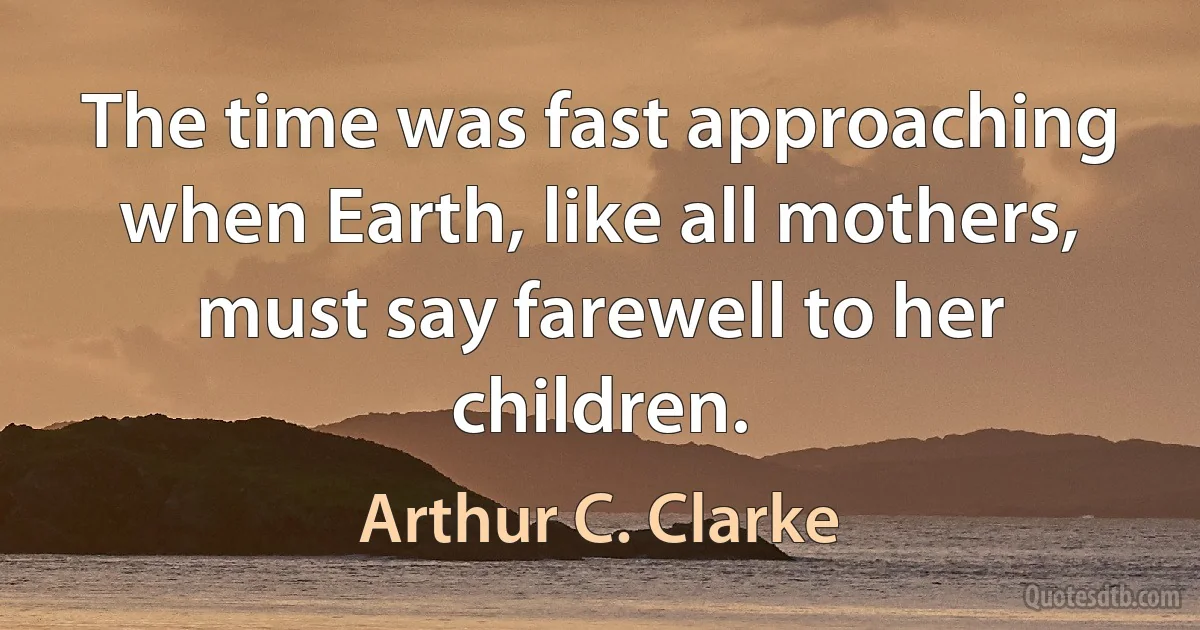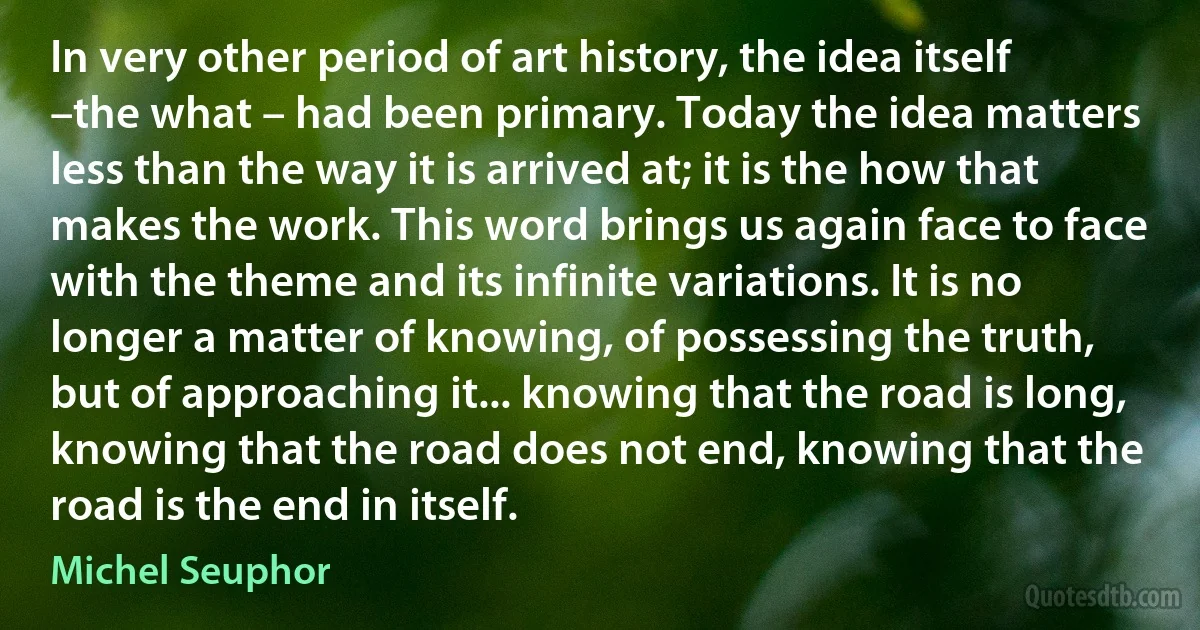Approaching Quotes - page 5
We may observe, that, notwithstanding the dogmatical, imperious style of all superstition, the conviction of the religionists, in all ages, is more affected than real, and scarcely ever approaches, in any degree, to that solid belief and persuasion, which governs us in the common affairs of life. Men dare not avow, even to their own hearts, the doubts which they entertain on such subjects: They make a merit of implicit faith; and disguise to themselves their real infidelity, by the strongest asseverations and most positive bigotry. But nature is too hard for all their endeavours, and suffers not the obscure, glimmering light, afforded in those shadowy regions, to equal the strong impressions, made by common sense and by experience. The usual course of men's conduct belies their words, and shows, that their assent in these matters is some unaccountable operation of the mind between disbelief and conviction, but approaching much nearer to the former than to the latter.

David Hume
One day, while I was painting a landscape in the neighbourhood of Algiers [March 1881] I saw a man approaching who seemed to be dressed in purple and cloth-of-gold... When the traveler reached me, my illusion vanished; my emir was nothing but a flea-bitten beggar. The sun, the divine sun had enriched him with its light... It's always the same in Algeria. The magic of the sun transmutes the palm-trees into gold, the water seems full of diamonds and men become the Kings from the East.

Pierre-Auguste Renoir
My heart revolts against the spectre of Almighty indifferent to the pain of sentient being. My conscience rebels against the injustice, the cruelty, the inequality that surrounds me on every side. But believe in man, in man's redeeming power, in man's remoulding energy, in man's approaching triumph through knowledge, love and work.

Annie Besant
In the past century a myth has grown up that free market capitalism-equality of opportunity as we have interpreted that term-increases such inequalities, that it is a system under which the rich exploit the poor. Nothing could be further from the truth. Wherever the free market has been permitted to operate, wherever anything approaching equality of opportunity has existed, the ordinary man has been able to attain levels of living never dreamed of before. Nowhere is the gap between rich and poor wider, nowhere are the rich richer and the poor poorer, than in those societies that do not permit the free market to operate.

Milton Friedman
But he, with these burthens on him, planned, commenced, and completed, the History of India; and this in the course of about ten years, a shorter time than has been occupied (even by writers who had no other employment) in the production of almost any other historical work of equal bulk, and of anything approaching to the same amount of reading and research. And to this is to be added, that during the whole period, a considerable part of almost every day was employed in the instruction of his children: in the case of one of whom, myself, he exerted an amount of labour, care, and perseverance rarely, if ever, employed for a similar purpose, in endeavouring to give, according to his own conception, the highest order of intellectual education.

John Stuart Mill
I seem to have come to much of the same conclusion as you have reached, though approaching it from the direction of economics and the social sciences rather than from biology - that there is a body of what have been calling "general empirical theory," or "general system theory" in your excellent terminology, which is of wide applicability in many different disciplines. I am sure there are many people all over the world who have come to essentially the same position that we have, but we are widely scattered and do not know each other, so difficult is it to cross the boundaries of the disciplines.

Kenneth Boulding
We are approaching a millennium; the year 2000 draws on apace. The last time mankind had this experience a chaos comparable to our own was observable in many parts of the world; monsters and portents were reported from all quarters of the globe. We need not believe in these monsters and portents as actualities any more than we need believe the reports of flying saucers today; what is significant is that men yielded to an inner compulsion to fancy such things, and in this sense they were artistic creations rooted in fear much as are the pictures and images which we have been discussing.

Robertson Davies
...we are approaching a time when, in Moravec's words, 'almost all humans work to amuse other humans.' In rich countries, that time has already arrived. The old industries have been exported to the developing world. At home, new occupations have evolved, replacing those of the industrial era. Many of them satisfy needs that in the past were repressed or disguised. A thriving economy of psychotherapists, designer religions and spiritual boutiques has sprung up. Beyond that, there is an enormous grey economy of illegal industries supplying drugs and sex. The function of this new economy, legal and illegal, is to entertain and distract a population which - though it is busier than ever before - secretly suspects that it is useless. Industrialisation created the working class. Now it has made the working class obsolete. Unless it is cut short by ecological collapse, it will eventually do the same to nearly everyone.

John N. Gray
Surrealism in its first period offered specific methods for approaching the images of concrete irrationality. These methods, based on the exclusively passive and receptive role of the surrealist subject, are now [1935] in liquidation and giving place to new surrealist methods of systematic exploration of the irrational.

Salvador Dalí
A musician once said: In art, truth and reality begin when one no longer understands what one is doing or what one knows, and when there remains an energy that is all the stronger for being constrained, controlled and compressed. It is therefore necessary to present oneself with the greatest humility: white, pure and candid with a mind as if empty, in a spiritual state analogous to that of a communicant approaching the Lord's Table. Obviously it is necessary to have all of one's experience behind one, but to preserve the freshness of one's instincts.

Henri Matisse
The tremendous danger, however, contained in this totalitarian system only became abundantly clear at the moment when we were approaching the end. It was then that one could see what the meaning of the principle was, namely, that every order should be carried out without any criticism. Everything . . . you have seen in the way of orders which were carried out without any consideration, did after all turn out to be mistakes . . . This system let me put it like this to the end of the system it had become clear what tremendous dangers are contained in any such system, as such quite apart from Hitler's principle. The combination of Hitler and this system, then, brought about this tremendous catastrophe to this world.

Albert Speer
Approaching it in one way, I see no essential difference between a line one calls 'abstract' and a 'fish'. But rather an essential likeness. This isolated line and the isolated fish alike are living beings with forces peculiar to them, though latent. They are forces of expression for these beings and of expression on human beings, because each has an impressive 'look' which manifests itself by its expression. But the voice of these latent forces is faint and limited. It is the environment of the line and the fish that brings about a miracle: the latent forces awaken, the expression becomes radiant... The environment is the composition. The composition is the organized sum of the interior functions (expressions) of every part of the work.

Wassily Kandinsky



